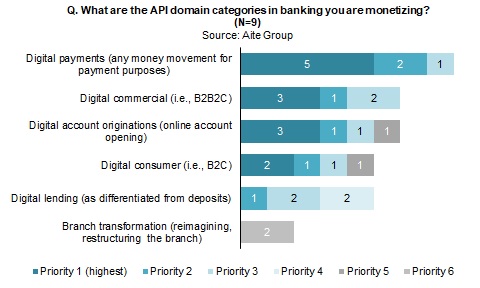London, 3 March 2020 – The arrival of the API economy has facilitated collaboration among organizations around the globe. APIs enable banks and other financial services providers to share data and access third-party applications using common standards. Technology companies have developed API platforms to support banks in their digital transformation. Buthow can banks and fintech companies leverage the API economy to create value for their customers and generate new business?

This report helps both banks and fintech vendors understand how open banking and APIs can be monetized, i.e., which fee/revenue share models are available and how these are applied in practice. It is based on a series of telephone interviews, conducted in September and October 2019, with nine digital banking executives from global financial institutions and fintech vendors.
This 27-page Impact Report contains nine figures and one table. Clients of Aite Group’s Wholesale Banking & Payments or Retail Banking & Payments service can download this report, the corresponding charts, and the Executive Impact Deck.
This report mentions Bancorp, BBVA, Fidor, Fiserv, Moven, MYbank, N26, Plaid, Raisin, RBS, Revolut, Solaris Bank, Starling Bank, Simple, Telefónica, Tink, Token.io, TransferWise, TrueLayer, Vaamo, WeBank, Wirecard, and Yodlee.
About the Author

Enrico Camerinelli
Enrico Camerinelli is a Strategic Advisor at Datos Insights specializing in commercial banking, cash and trade finance, and payments. Based in Milan, he brings a strong European focus to the Commercial Banking practice at Datos Insights. Enrico has been widely quoted by publications ranging from American Banker to the Financial Times. He has contributed editorial content to publications such as Supply Chain Europe,...
Other Authors

Ron van Wezel
Ron van Wezel is a Strategic Advisor in Retail Banking & Payments for Datos Insights, providing research and advisory services to clients globally. His coverage includes payments, open banking, and digital transformation. Ron is a renowned expert in payments and digital banking. He brings to Datos Insights over 30 years of experience in product development and innovation, advising clients on a...
